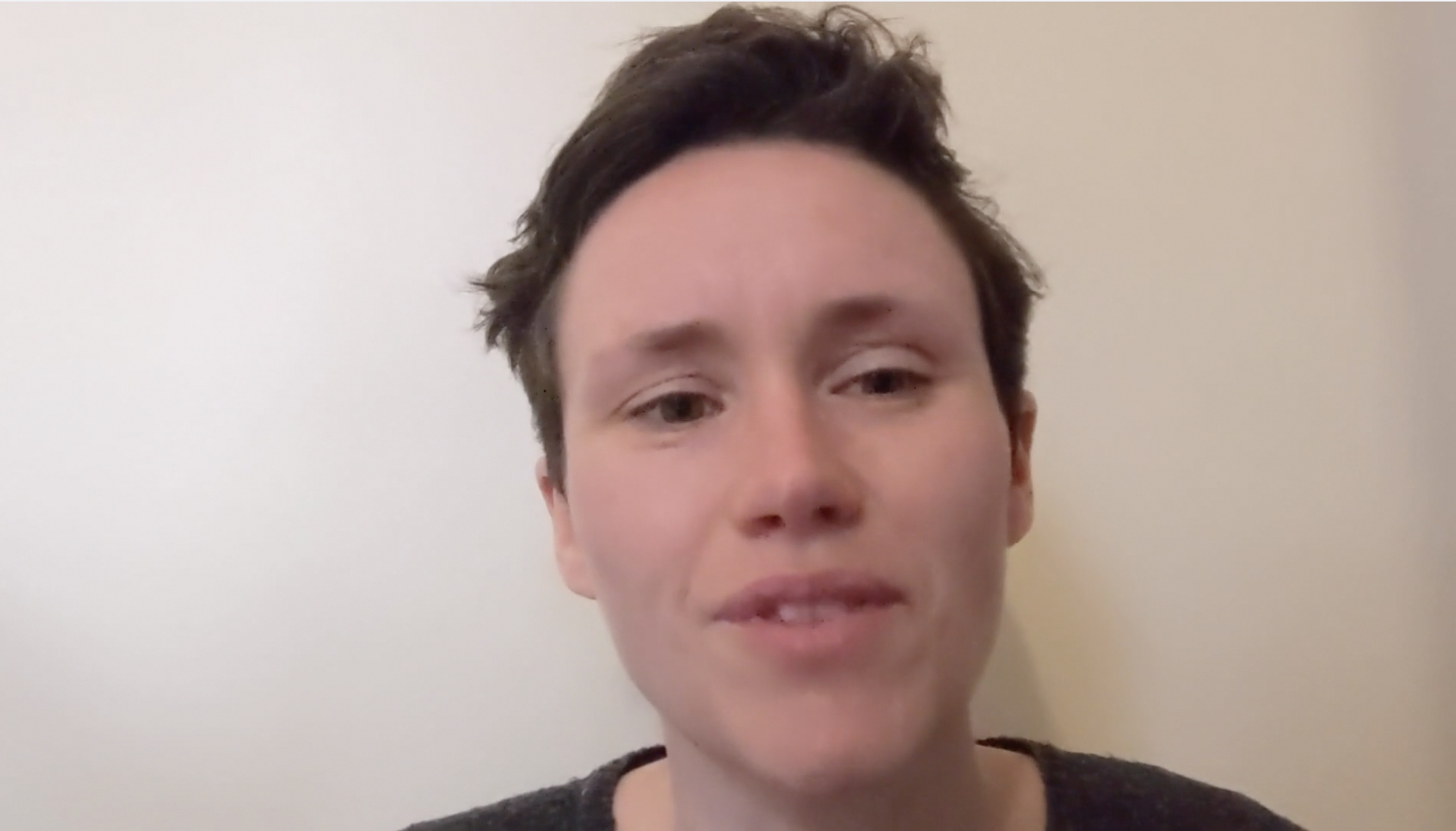
MSRA: Complete Guide 2025
Over half of all junior doctors applying for Specialty Training posts each year will need to undertake The Multi-Specialty Recruitment Assessment (MSRA); our complete guide will provide you with information for the MSRA 2025.
Multi-Specialty Recruitment Assessment / MSRA Exam
The MSRA is a computer-based exam designed to assess essential competencies. It is currently used for entry in postgraduate medical training for the following specialities:
- ACCS Emergency Medicine CT1/ST1
- Anaesthetics CT1/ACCS
- Broad Based Training (Scotland) ST1
- Clinical Radiology ST1
- Community Sexual and Reproductive Health ST1
- Core Psychiatry Training CT1
- Core Surgical Training CT1
- General Practice ST1
- Nuclear Medicine ST3
- Neurosurgery ST1/ST2/ST3
- Obstetrics and Gynaecology ST1
- Ophthalmology ST1
The MSRA results are used differently within each speciality’s selection process, so it’s useful to check specific national recruitment websites for further guidance on individual specialities.
In 2024, General Practice ST1 and Core Psychiatry Training CT1 assessed and ranked candidates based solely on their MSRA performance, and they will continue to do this for 2025. For Obstetrics and Gynaecology, the MSRA score was used to shortlist the lowest scoring applicants and bypass the highest scoring candidates straight to offer, and this will also be the same this year. The MSRA is no longer used for Paediatrics recruitment.
“A really useful resource. The only thing I used. The notes were really helpful, they were really at the right level for the exam.”
Test Centre Locations
The MSRA is delivered in Pearson VUE test centres across several consecutive days within the MSRA window. The exam is offered throughout the UK and internationally; you can find your closest test centre here. It’s worth noting that there may not be availability at your nearest or preferred Pearson VUE test centre, due to the demand within the short assessment window, so you may be required to travel further to sit your exam.
Please note: currently, all MSRA invitations will be for MSRAs delivered within a Pearson VUE test centre; however, once you receive your invitation, you can apply for a remote test ‘by exception’ if you meet the criteria set to do so. Requests for remote examinations are assessed and approved on a case-by-case basis. You can find out more remote testing for the MSRA here.
MSRA Exam Dates 2025
Once the application window has closed for your chosen specialty and successful candidates have been longlisted, you’ll be invited to register with Pearson VUE and book your MSRA, if you meet the eligibility criteria outlined during the application process. Although the application deadline date and the MSRA assessment window are the same across the specialties, the MSRA registration invites will be sent out at different times, depending on the longlisting timeframe, which may affect the test centre availability when you come to register.
Please note that if you fail to register and complete the MSRA, your application will be withdrawn.
The most recent MSRA exam dates were 2 – 13 January 2025 and 17 – 28 February 2025. The February 2025 MSRA exam dates were a second date added to accommodate a surge in applications.
There’s usually an MSRA sitting in September each year. However, as of now, no official September 2025 exam dates have been scheduled. To give you an indication of when they might be, for 2024, the exam took place between 6 – 13 September.
You can find more information about the MSRA sittings and allocation process here.
So you can pick the most suitable option for you and your test date, the Medibuddy adaptive, personalised MSRA question bank offers three subscription options that vary in price depending on the length of the subscription you need.
MSRA Exam Cost
There is no charge for the assessment; however, you may incur travel and accommodation costs, which will not be reimbursed, so it’s advised that you book your assessment as soon as possible to avoid missing out on your closest test centre.
Structure of MSRA
The MSRA is separated into two sections, and you can see an example of a question from each section in our question bank below.
Professional Dilemmas Paper
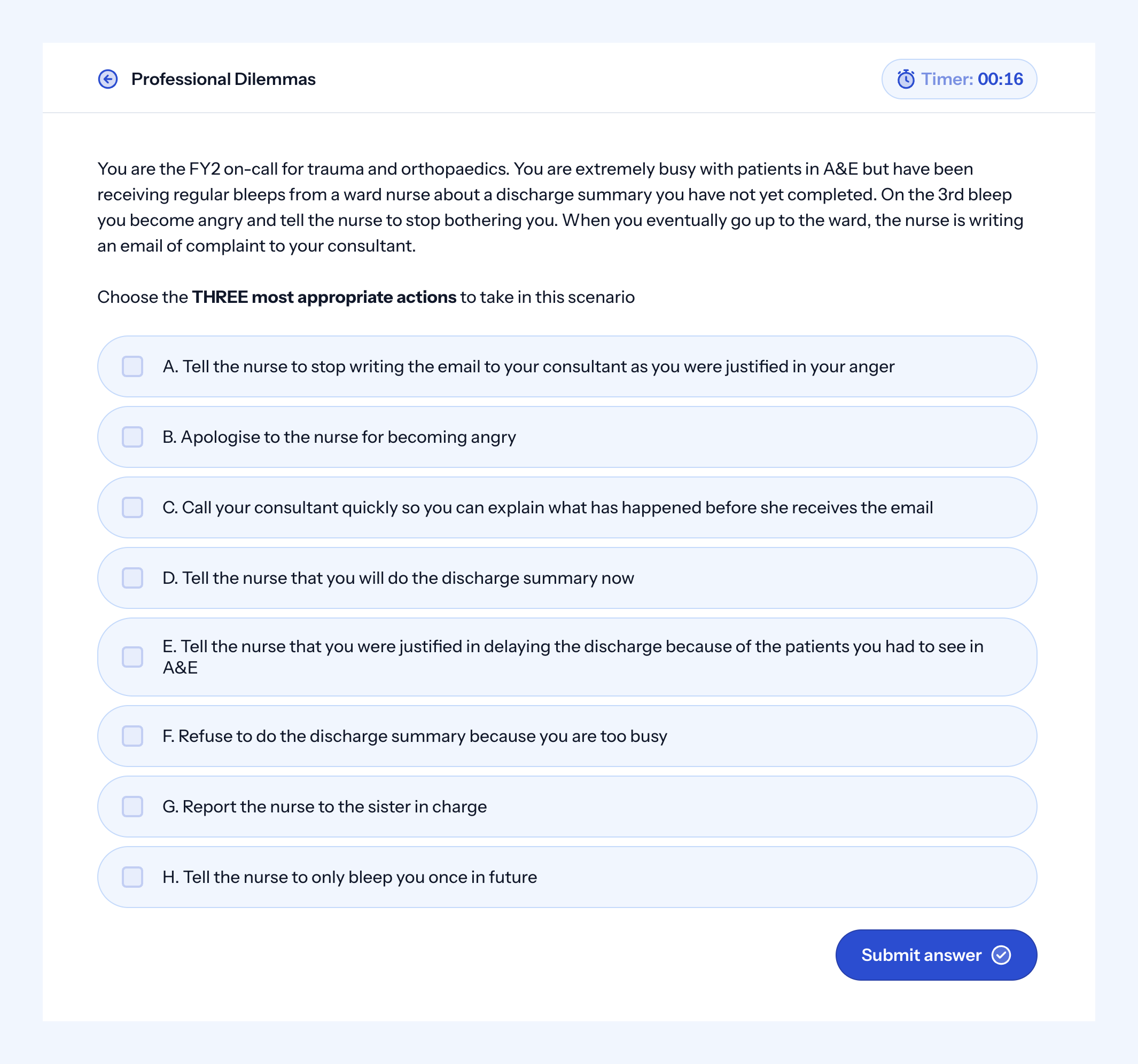
Clinical Problem Solving Paper
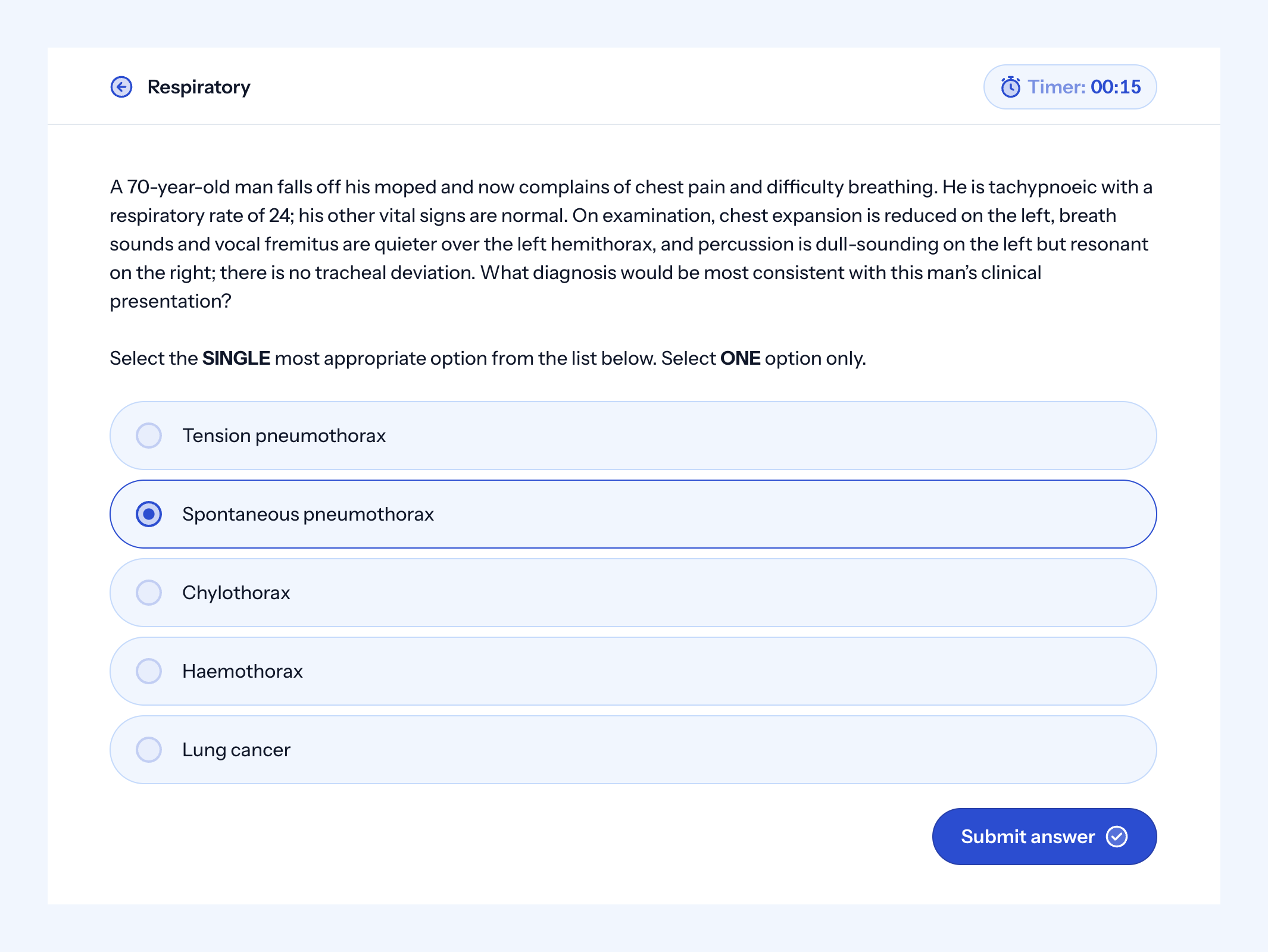
Both elements of the exam are based on the Foundation Programme curriculum and are designed to assess how you apply your clinical knowledge to support you to make clinical decisions.
How Many Questions in the MSRA?
| MSRA Paper | Number of Questions | Test Time |
|---|---|---|
| Professional Dilemmas (PD) | 50 scenarios | 95 minutes |
| Clinical Problem Solving (CPS) | 86 questions | 75 minutes |
Pilot questions are also included alongside the test for the purpose of item development; however, you will not be scored on these.
Professional Dilemmas Paper
The Professional Dilemmas Paper is a Situational Judgement Test (SJT) designed to assess your response to situations involving challenging professional dilemmas.
Although a general understanding of typical primary/secondary care work is required, the Professional Dilemmas Paper does not assess specific knowledge within speciality training or your problem solving skills. Rather, it focuses on professional attributes and behaviours when interacting with patients and colleagues, and requires you to demonstrate your judgement regarding the most appropriate behaviours within given scenarios.
The paper centres around the following core areas:
- Professional Integrity
- Coping with Pressure
- Empathy and Sensitivity
Format of the Professional Dilemmas Paper
The Professional Dilemmas Paper is separated into the following two parts, with around half of the 50 scenarios for each question type:
| Part 1 – Ranking | Part 2 – Multiple Choice |
|---|---|
| You will be given scenarios and asked to judge the appropriateness of four or five independent actions in response to the situation presented. You will be required to rank the actions in order from the most to the least appropriate response to the situation. | You will be given eight plausible actions for each scenario and asked to select the three most appropriate actions. You will be required to consider the appropriateness of each individual action and select three responses that will fully resolve the situation when used in combination. |
Every time you answer a question in the Medibuddy MSRA question bank you will be shown if your answer is correct or incorrect, with a detailed explanation, which is a really useful tool for your revision. The question bank is adaptive, which means you get a personalised learning experience, so every question you answer has been selected specifically for you to improve your score.
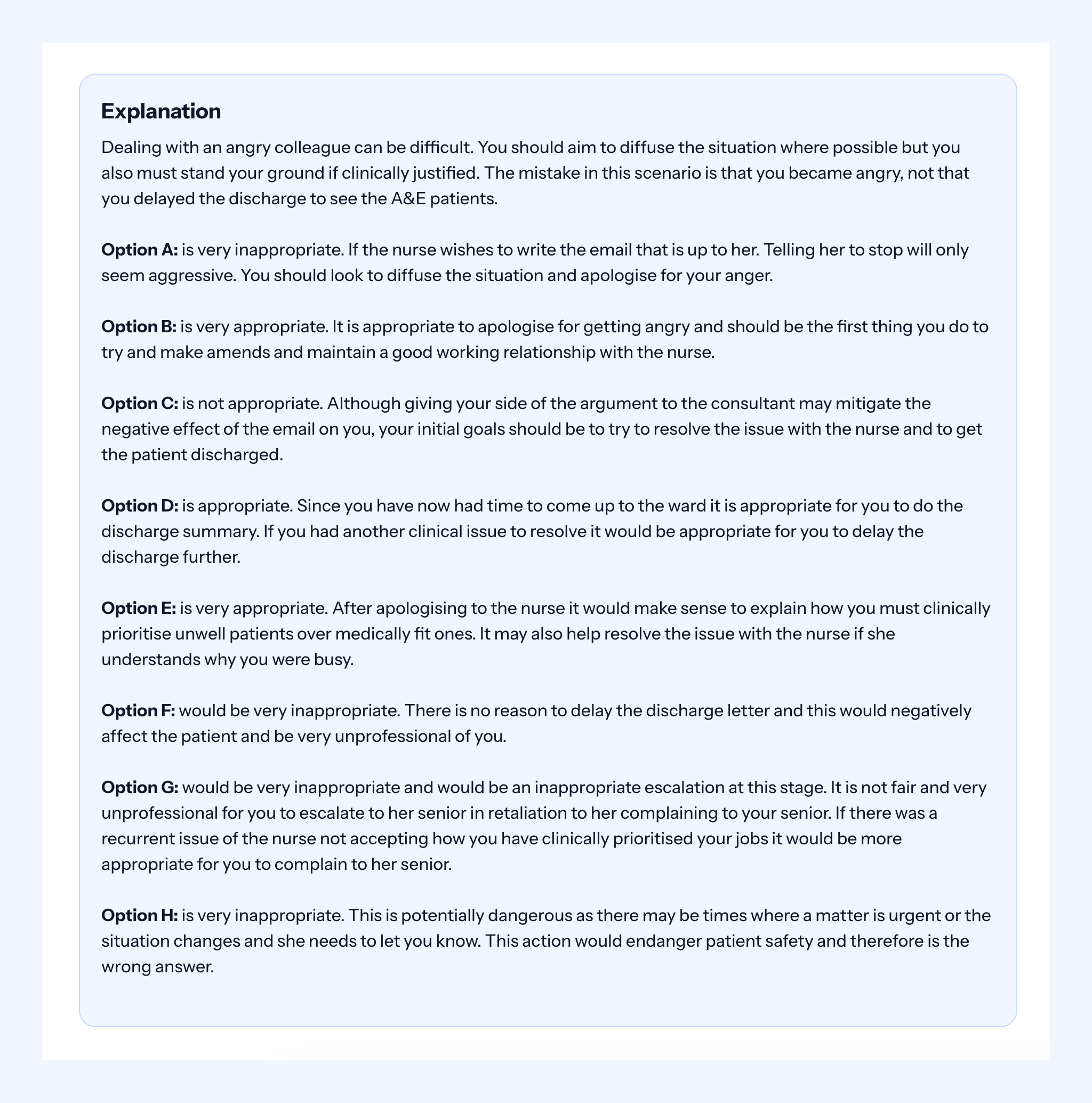
Clinical Problem Solving Paper
The Clinical Problem Solving Paper is designed to assess your ability to apply your clinical knowledge and make clinical decisions within the context of everyday practice.
Although the scenarios are relevant to foundation level clinical practice (FY2), it does not aim to simply assess your recall of knowledge, but focuses on your ability to synthesise and apply your medical knowledge appropriately.
Format of the Clinical Problem Solving Paper
You will be presented with clinical scenarios and required to utilise your judgement and problem solving skills to determine the appropriate diagnosis and treatment of patients.
Within the 86 questions, there are two types of questions, making up roughly half of the questions each. The question types are:
| Extended Matching Questions | Single Best Answers |
|---|---|
| You will be given a set of responses (usually between 7 – 10) and asked to select the most appropriate option for multiple, individual scenarios. Each of the responses may be used once, more than once or not at all when selecting a suitable option for each scenario. | You will be given a set of responses (usually between 5 – 8 in this instance) and asked to select the most appropriate option for a single scenario. |
The Clinical Problem Solving Paper includes scenarios which cover the following clinical topics:
- Cardiovascular
- Dermatology / ENT / Eyes
- Endocrinology / Metabolic
- Gastroenterology / Nutrition
- Infectious Disease / Haematology / Immunology / Allergies / Genetics
- Musculoskeletal
- Paediatrics
- Pharmacology and Therapeutics
- Psychiatry / Neurology
- Renal / Urology
- Reproductive
- Respiratory
Each test paper will have a balance of scenarios covering all twelve topics.
The test also assesses the following core competencies:
- Investigation – Focusing on specific investigations to support a more conclusive diagnosis or to rule out possible causes of illness / injury.
- Diagnosis – Evaluating the symptoms presented by a patient to identify a possible condition, disease or injury.
- Emergency – Recognising patient risk and a potential serious illness requiring immediate action.
- Prescribing – Advising, authorising or reviewing a patient’s clinical management plan – specifically the use of medicine / drugs.
- Management (non-Prescribing) – Advising, authorising or reviewing a patient’s clinical management plan – specifically the use of non drug-related treatment.
Our adaptive MSRA question bank will not only tell you which questions you have answered correctly or incorrectly, but it will also tell you which parts of the syllabus you have “mastered”, and which parts you need to spend more time on. A topic is considered mastered once you have correctly answered enough questions on each of the various sections within the topic to show you have a good understanding of it. For example, in order to master the Cardiovascular section of the question bank, you would need to have answered questions correctly on heart failure, hypertension, AF, etc. You can clearly see on the dashboard which topics you need to spend more time working on.
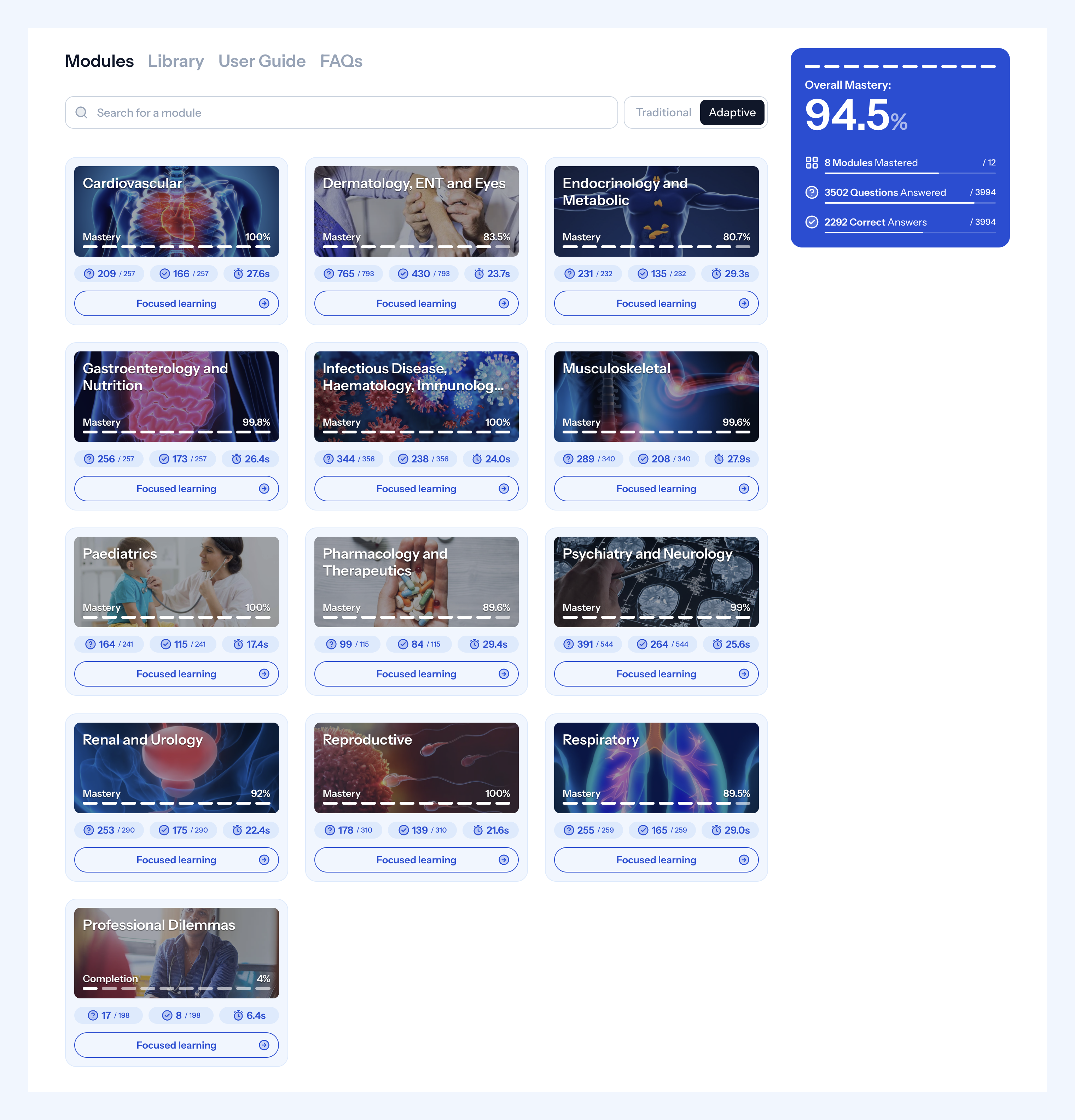
When working through your questions, the AI-powered algorithm will carefully select questions for you. You won’t just answer questions in a random order; instead, each question will be carefully selected based on your strengths and weaknesses within the syllabus.
MSRA Results
Shortly after the MSRA testing window has closed, your MSRA result will be available within your Oriel account against your application shortlist scores.
How is the MSRA scored?
For the Clinical Problem Solving paper, one mark is awarded for each correct response. The Professional Dilemmas paper is scored against pre-determined keys to make the test standardised and fair for all candidates. This involves comparing your responses to the pre-determined key – i.e. the model answer combination – and awarding you marks based on how closely matched these are. The closer your responses are to the pre-determined key, the more marks you’ll be awarded; however, you can still pick up points even if your answer doesn’t completely match this. As there is also no negative marking, it’s worth attempting to answer all the questions. Remember, you can still pick up some marks on answers which aren’t entirely correct, but you won’t receive any marks for missed questions.
Each specialty uses the MSRA score differently, so check the specific national recruitment websites for further guidance on your chosen speciality. For the majority of specialties, your score will be used to shortlist for interview, and contribute to your overall ranking, along with your interview score.
Details of how the GP application process incorporates the MSRA score are given below as an example:
GP entrance exam / MSRA GP
For GP applicants, your offer and location of your offer will depend solely on your MSRA score, as opposed to an interview being included like in previous years. Some locations are much more popular than others, so will require a higher MSRA score to be in line with the competition. The score for each paper is normalised; this is usually around a mean score of 250, but as normalisation is dependent on each year’s average scores, there could be a variation of up to 40 marks either side of the mean score.
The scores for each paper are also banded (1 – 4), with a band one indicating that the minimum threshold has not been met. If you achieve a band one in either of the papers, you will not be able to progress with your application. However, if you are unsuccessful in achieving the acceptable standard, it is possible to resit the MSRA within a different assessment window, as long as it’s within the same recruitment year. If you achieve a passable score (bands 2-4), you will not be able to resit the MSRA within the same recruitment year.
How to prepare for the MSRA / MSRA Exam Preparation
While your previous studies and work as a junior doctor will have prepared you for some of the questions and scenarios within the MSRA, it’s advisable to allow adequate revision time for the MSRA, as you would with any other exam.
The following tips will help you with your MSRA preparations:
1. Allocate as much time as you can to preparing for the MSRA
The more practice questions you do, the more chance you have of scoring a higher score; it’s that simple.
2. Familiarise yourself with the topics that will be covered within the Clinical Problem Solving Paper
Dedicate enough time to covering each specialty to ensure that you are confident in all areas that will be included within the paper. Focusing on one specialty at a time will also allow you to identify common themes and consolidate your learning within each topic. Your mastery level for each topic in the Medibuddy MSRA question bank will help you decide which areas you should focus on.
3. Include timed papers within your MSRA preparations
Exposure to timed practice papers will give you a realistic view of how much you’ll get through within the time frame/how long you’ll have to check back through your answers. Practice completing the two papers back to back so you’re used to the demands of the full MSRA – almost three hours completing an exam is no easy task.
MSRA Exam Practice
As mentioned for Obstetrics and Gynaecology ST1, in some cases, a high score can allow you to skip the interview section of the application and be ranked above fellow applicants, therefore increasing your chances of receiving a training offer in your preferred programme/location. While General Practice ST1 and Core Psychiatry Training CT1 don’t include an interview; instead, they assess and rank applicants solely on their MSRA score. So it’s worth investing the time preparing for the MSRA exam.
To effectively revise for the questions/scenarios that may appear on the MSRA, invest your time in completing practice questions and full timed mock exams.
MSRA Practice Questions / MSRA Question Bank
To really show off your skills and achieve a high score on the MSRA, it’s worth putting in the effort to revise for the assessment. Completing a combination of practice questions and full practice exams during your revision for the MSRA will help you to fully prepare for the exam.
1. Practice Question Banks
You can work through the MSRA practice questions in your own time, allowing you to familiarise yourself with the different question formats and types of scenarios you will encounter in the exam.
2. Timed Practice Test
By mimicking the exam conditions, you can develop your speed to ensure that you can complete all the questions within the timeframe, and your stamina to complete the two papers.
When choosing your MSRA preparation resources, it is important to think about the costs involved, the quality of the questions and the number of questions, and the platform being used. Naturally, we are big fans of our adaptive MSRA question bank, and we have included a comparison table below to show how different resources compare.
 |
Passmedicine | Pastest | MCQBank | eMedica | |
|---|---|---|---|---|---|
| Number of questions | 4,000+ | 2,750+ | 1,950+ | 1,700+ | 2,200 |
| Price | £40 - £60 | £25 - £30 | £35 - £55 | £48 - £92 | £49 - £119 |
| AI Personalised Learning |  |
 |
 |
 |
 |
| Mastery Level Calculated |  |
 |
 |
 |
 |
| Spaced Repetition |  |
 |
 |
 |
 |
How artificial intelligence technology can improve your MSRA score
The Medibuddy team is a group of doctors with a special interest in using the latest educational technology to improve medical education.
Personalised learning, where educational content is tailored to someone’s individual strengths and weaknesses (think 1-on-1 tutoring or small group learning) has been shown time and time again to beat non-personalised learning (lectures, textbooks, non-adaptive question banks, etc.) when it comes to exam scores.
Until now, the only way to access personalised learning for exams like the MSRA was to pay for expensive courses. These don’t represent value for money for most candidates who instead use question banks to prepare for their exam.
Question banks are a great way of breaking down information into bitesize chunks, but they are an inherently inefficient way to prepare for an exam. You answer questions in a random or pre-set order that bears no relation to the gaps in your knowledge or the topics that would give you the biggest boost in your exam score.
This is fine if you’re the kind of person who completes multiple question banks, multiple times before an exam. It doesn’t matter if the questions you answer aren’t targeted because by doing thousands and thousands of questions, you’ll eventually cover your knowledge gaps anyway.
However, the majority of us aren’t able to do this much preparation before a postgraduate exam (which is why failure rates are so high!). When you’re working nights, weekends or normal days which overrun, it’s hard to find the time!
This is why we’ve released the Medibuddy MSRA Adaptive Question Bank. Our question bank is the only one on the market that uses machine learning algorithms to identify your strengths and weaknesses, ensuring that every minute of your revision is focused on maximising your exam score.
It’s also the largest on the market, offering over 4000 questions written specifically for the MSRA.
Our super smart question bank adapts to YOU, providing all the benefits of personalised learning at a fraction of the cost of a course. We’re really excited about it (I’m sure you can tell!) and probably a bit biased, but we think it’s the best way to prepare for the MSRA in 2025!
MSRA Tips
Hopefully this has provided you with basic information about the MSRA to help you to begin your preparation for the exam.
Below are a few final nuggets of information to support you with your MSRA preparations:
- Pearson VUE provides a generic tutorial which gives you the opportunity to familiarise yourself with the controls and screen layout of the exam – useful so you know what to expect when it comes to the exam, so no time is wasted trying to figure these out.
- During the exam, there is a glossary of frequently used terms and a list of abbreviations – great to use if you’re less familiar with the UK medical system or if you just have a moment of panic and go blank.
- It’s so basic, but remember to read the question carefully – it’s easy to miss things when you’re rushing, and the information provided will help you give the best possible answer to the question.
- We mentioned it already, but remember the papers are not negatively marked, so answering a question will always be better than leaving it blank.
The most important thing to remember is not to underestimate the MSRA and to prepare fully to give yourself the best possible chance of scoring highly on the exam.
Take your MSRA revision to the next level with our artificial intelligence powered, adaptive question bank
Our state of the art algorithms will help you progress faster than ever.
The following links have been used as research when developing this post and may also be useful to you for further information:
- Medibuddy – A Guide to GP Recruitment 2025
- Multi-Specialty Recruitment Assessment (MSRA) – Information
- NHS GP Recruitment – MSRA Guidance for Applicants
- NHS GP Recruitment – Recruitment Timelines and Vacancies (ST1 & TGPT)
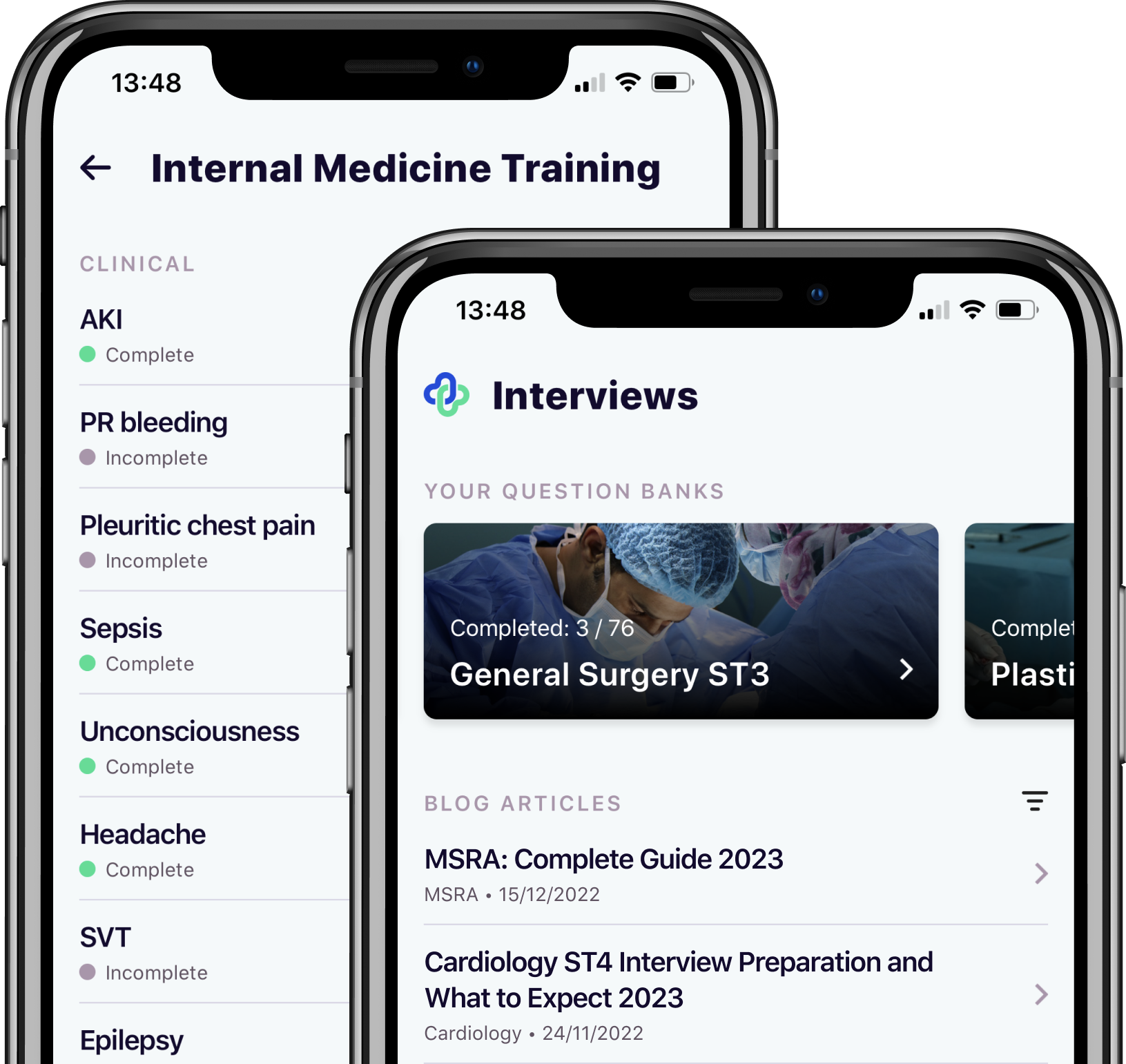
Take your subscriptions with you
Our mobile app allows you to access your interview and exam question banks wherever you are.
